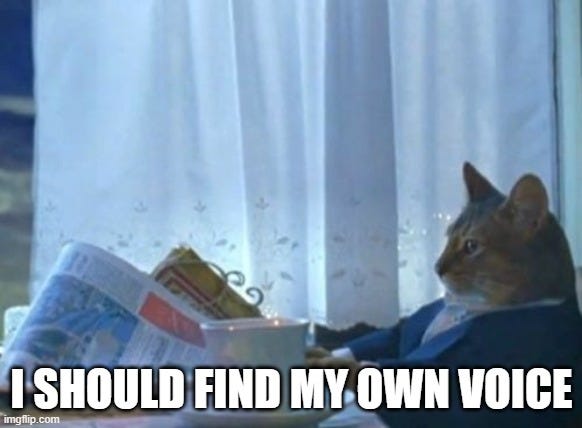How to Find Your Voice
"Something strange happens when people try to write... instead of talking like themselves, they put on a mask." David Perell
The best kind of writing opens a portal.
As a writer, you drop into a deep conversation with your mind. Suddenly all talking stops. Things speed up. Words pour out of you. Your fingers try their best to keep up and transcribe what emerges. You turn into a vessel, an agent for a deep source of creative intelligence. When you edit the work, it feels like policing a precious stone. Every subtle chisel uncovers more magic. What you write feels natural and alive.
That collection of words carries the power to transport readers back to a moment of deep flow. It’s a portal for time travel, a shared hallucination. Straight magic.
But much of the time, something else happens when people write. They turn off the fountain of joy and disconnect from their source. The writing doesn’t sound like them at all. Instead of joining an intimate conversation between friends, readers find themselves in a colorless lecture hall. The divine spark has left the building. Instead of whirling through time with the writer, you close the tab.
How can we be so alive, yet our writing feel so dead?
It’s a case of people getting in their own way and avoiding themselves.
Identity crisis
What a vexing issue. After all, you have a voice already.
You’re committed to creating and sharing. You are exposing yourself. You decided to be different from the 90% of people who passively participate. And now you spend your time editing your writing only to make it sound like yourself again?
What the heck?
I’ve wrestled with this a lot (still do!) and I have a few practical tips. But I’ve also had my mind blown by a vocal workshop and now believe that the quest to ‘find your voice’ is misunderstood.
The search for our voice can be viewed as a struggle to transcend the influence of our creative idols. Literary critic Harold Bloom called it the ‘anxiety of influence’. This “burden of influence has to be borne,” he concluded in The Western Canon, “if significant originality is to be achieved.”
This anxiety “cripples the weaker talents but stimulates canonical genius,” Bloom argued. We fear unconsciously regurgitating what we admire. Somehow we need to consciously avoid this yet also find the relaxed flow that opens the portal.
The desire to write greatly is the desire to be elsewhere, in a time and place of one’s own, in an originality that must compound with inheritance, with the anxiety of influence. — Harold Bloom
Just do it
Another mistake is to label yourself. Once you call yourself ‘a writer’, all the beliefs about what a writer should be start bubbling up. You put another mask on your face, a layer filled with interference from your unconscious beliefs, another layer of separation between you and your audience. Beware the masks you wear. Drop the labels. Don’t be a writer. Write. Write a lot.
One way to find your voice is simply to write as much as you can. Write until you’ve spilled your mind on the page and your pen stops moving. Experiment with deadlines and commitments to a variety of writing assignments (‘say yes to everything’). Constraints, as my friend Alix likes to say, breed creativity.
Rotate through different topics and forms and observe how your voice changes. Reflect on who is speaking — which part of you is leading or which influence is surfacing. You may have to write your way through your reaction to someone else’s work until you find your own.
Another way to break the chains of influence may be to get closer to them. Try on your favorite writer like a glove through copy work: copy a page (or more) of their work by hand (see David Perell and Nathan Baugh). Get a feel for what it’s like to write something great. Find the rhythm of your influence, then leave it behind. (Honestly, I should make more time for this.)
It can take a while for all of your parts and influences to coalesce into a distinct voice. Keep writing.
Meet your voice, meet yourself
Most of us don’t aspire to expand the world’s literary canon with a great work (a writer’s Ozymandias). What we are looking for, in our lives and our work, is to uncover our shining individuality. We strive to be authentic and original. Finding your voice as a writer is just a specific case of the desire to find — and share — your voice as a unique human being.
Over the past few weeks, I spent my Saturdays with some thirty people doing vocal exercises in a space near Flatiron. I’d signed up for this vocal workshop to ‘fix’ things about my voice that I didn’t like. For example, I wanted it to be more open…
I am able to write articles like this because I operate independently, without advertising or corporate affiliation. If you want to support my work, become a paid subscriber and share my work with friends. Thank you.
Keep reading with a 7-day free trial
Subscribe to Frederik's Age of Alchemy to keep reading this post and get 7 days of free access to the full post archives.





